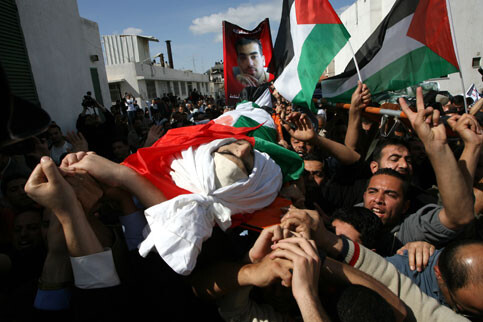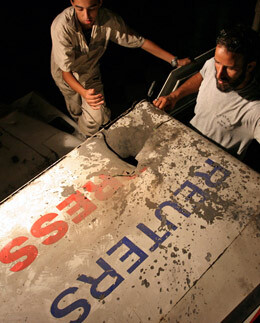The Electronic Intifada 18 April 2008

Palestinian mourners attend the funeral of Reuters cameraman Fadel Shana’a in Gaza City, 17 April 2008. (Wissam Nassar/MaanImages)
GAZA CITY, 18 April (IPS) - Fadel Shana’a just had to go to the scene of the Israeli bombing. As a Reuters cameraman, that was his job. He wasn’t the only one killed, but through his pursuit of attacks as they happen, he was always more at risk than most others.
Fadel Shana’a was killed Wednesday because he was in the firing line, but also because, eyewitnesses said, he had begun to film the tanks that were firing. A barrage of metal shrapnel pierced his body as a tank missile landed close to him.
Fadel Shana’a, 23, had been injured in August 2006 in the north of the Gaza Strip in an Israeli missile attack. This time he wasn’t lucky enough to survive.
After the first missile that killed Fadel, a second tank missile directly hit the Reuters vehicle in which Fadel had been traveling, killing two children and another civilian close by, and injuring 12 others, including five children. Wafa Abu Mezyed, 25, a Reuters sound man, was injured.
The Reuters silver colored Mitsubishi SUV carried “TV” and “Press” stickers in English and Arabic prominently across its doors, hood, and roof. And yet it was attacked more than once. Agency-France Press photographer Mohammed Abed who was driving behind Abed said the vehicle burst into flames after the second missile struck it. “I saw the body and head of my friend and colleague torn to pieces,” he said, visibly shattered by the loss.
Fadel Shana’a was among many journalists and photographers who had come to film the children and civilians injured by earlier Israeli air strikes and tank shelling. At least 20 Palestinians have been killed since dawn on Wednesday, among them Fadel and eight children.
Abu Mezyed said that after filming some children, Fadel turned to film Israeli tanks. That was when a tank immediately fired a missile in his direction, killing him.
Journalists have long been targeted in the region. Since September 2000, Israeli forces have killed nine journalists, and have wounded at least 170 others.
Reuters has 70 journalists and other members of the media in Palestinian and Israeli areas, 15 of them in Gaza. Last October, a Reuters photographer was injured by Israeli occupation forces close to the Erez crossing.

Fadel Shana’a was injured in an August 2006 Israeli air strike that hit the Reuters vehicle in which he was traveling. (Wesam Saleh/MaanImages)
The Palestinian Journalists Union announced a strike on Thursday in protest against the killing of journalists. Reuters editor-in-chief David Schlesinger called for an investigation. “This tragic incident shows the risks journalists take every day to report the news. All governments and organizations have a responsibility to take the utmost care to protect professionals trying to do their jobs,” he said in a comment posted on the agency website.
“Our thoughts are with his family. We request an immediate investigation into the incident by the Israeli defense forces.” The group Reporters Without Borders also called on Israeli authorities “to quickly investigate the circumstances that led to the Reuters cameraman’s death.”
Israel apologized for the killing of Fadel Shana’a, and pledged to investigate the circumstances of his killing.
Thousands attended the funeral of Fadel Shana’a Thursday. With his body was carried another stretcher bearing his camera.
But the attacks continue, for others to suffer, and still others to film. The attacks on Juhor al-Dik village, east of al-Bureij refugee camp have injured 35 people, at least eight of them critically. The injured include 17 children and a woman, according to the Palestinian Centre for Human Rights.
And there is not enough fuel for ambulances to get to the injured. Some of the injured have been brought to hospital on donkey carts.
The latest Israeli assault follows what the Ezz al-Deen al-Qassam Brigades, an armed wing of Hamas, called a “sophisticated ambush” in which three Israeli soldiers were killed.
Israeli Defense Minister Ehud Barak said on Wednesday: “We are aware of the suffering of the people of Gaza, but in our eyes, the suffering of the residents of communities that border on that area, and those of the Israeli army count more.”
All rights reserved, IPS - Inter Press Service (2008). Total or partial publication, retransmission or sale forbidden.
Related Links



